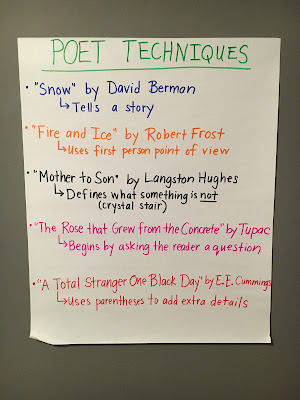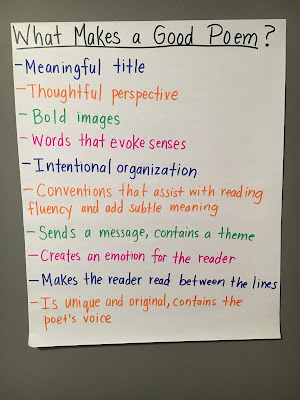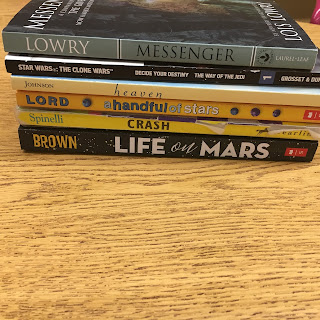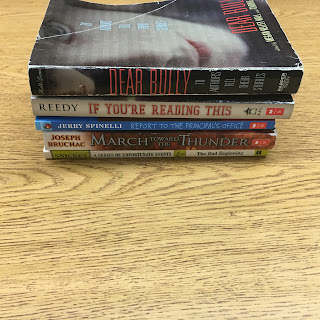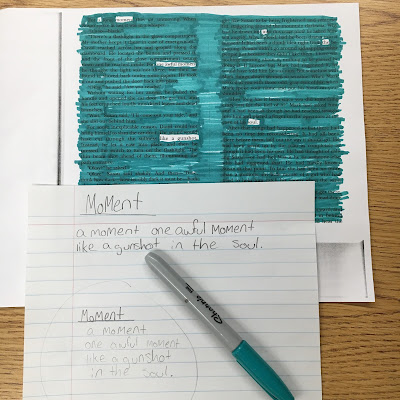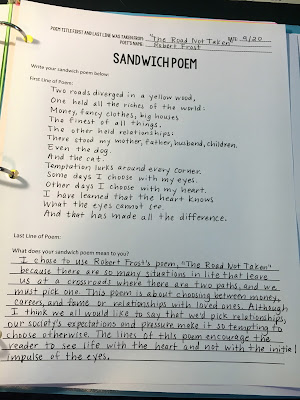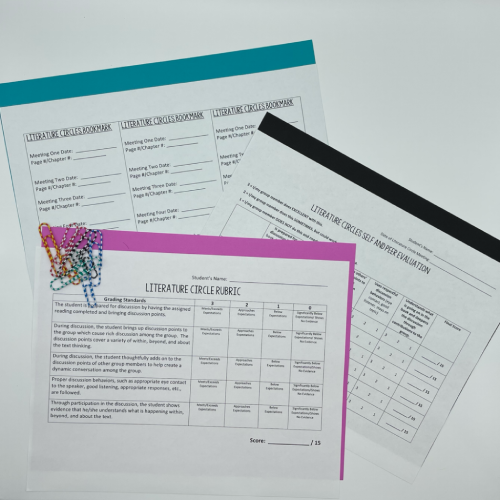You know that collective sigh, the one that choruses around the room when you enthusiastically announce, “Class, the next unit we’ll be entering into is poetry!” If poetry is taught the right way, students should be cheering at the thought of a Poetry Workshop day. Below I will outline the “why” of Poetry Workshop along with tips and tricks that I have picked up to make any poetry unit a raging success in your middle school classroom.
If you like what you read below and want to implement a Poetry Workshop in your classroom, make sure you check out the Poetry Workshop resource available in my TpT store. This resource will walk you through every single step of implementing Poetry Workshop in your classroom, along with the assembly of a student Poetry Workshop binder that can be utilized across the entire school year. Lesson plans, graphic organizers, grading rubrics, and so much more awaits you in this comprehensive resource.
Why Use Poetry Workshop?
*It’s a change of pace. We immerse students so heavily into Reading Workshop and Writing Workshop day after day. It’s nice to have the option to mix things up a bit with Poetry Workshop. It is also a great transition between units. For instance, maybe you’ve just completed a three-week persuasive writing unit and you’re about to head into a round of literature circles. Take a day or two hiatus in between to do Poetry Workshop once the Poetry Workshop Kick-Off lessons are completed. Poetry Workshop can serve as a natural transition between the big, heavy units throughout the whole school year.
*It will reach unexpected students. You may have a pretty good idea right away of who in your class excels at writing or can already read college-level material, but you may be surprised at which students soar while writing poetry. Poetry Workshop is a great way to hook in students who struggle or are unmotivated when it comes to reading and writing because it appears to be a manageable chunk. The thought of writing a five-paragraph essay or reading a 300-page book scares them half to death, but reading or writing a poem may not seem as scary.
*It’s a great way to teach literary elements on a smaller scale. Sometimes it’s too daunting for students to come up with the theme of an entire book, but starting out teaching theme through poetry is the perfect scaffold before teaching theme in relation to a novel. The concept of theme will transfer perfectly between a poem and a book, but more students will understand the concept if you start teaching it through a poem all students understand and can easily read and reread. The same goes for teaching figurative language. Poetry is the perfect pathway to finding examples of figurative language and teaching them how to identify and use it. Point of view is also a great lens to look at poems through and teach students about through poetry.
*It gets students to appreciate words and how words can evoke images. Poets have a gift for saying a lot with only a few words. It’s important that we’re teaching students how to be impactful writers in few words and make every word count. A poet keeps his/her audience in mind and thinks about what emotions he/she would like the reader to feel. Teaching-wise poetry allows so many pathways into teaching students about word choice, organization, sensory images, and audience awareness.
*Poetry removes the need for perfect capitalization and punctuation. The poet gets to structure his/her poem how he/she wants to, and there is an art in playing around with punctuation and capitalization while writing a poem. Releasing this pressure of having to write “right” will allow students to write freely and openly.
*A lot of times when we think about teaching poetry we think about having every student write a haiku, an “All About Me” poem, a name poem, a limerick, and then we call it good. Students publish a few poems, and we call it good for the year. This is not what Poetry Workshop is. Poetry Workshop gets students to read poems, analyze poems, consider techniques poets use that they would want to use, and write their own poems once they feel comfortable doing so. Teach students what poetry really is. As teachers, sometimes I think we’re afraid of poetry ourselves and then default into teaching poetry through a set of “form” poems. We hate it and are uncomfortable with it, so these views get passed right down to students. Let’s shift this attitude! Poetry can be a beautiful thing that teachers and students alike have a positive attitude about.
Tips for Teaching with Poetry Workshop:
Tip One: Teach Poetry in Phases
I was first introduced to the idea of teaching poetry in phases when I read Fountas and Pinnell’s book, Guiding Readers and Writers. Here’s how I’ve taken the idea of phases and broken them down to work for my middle school students.
Phase One: Collecting & Responding Have students read through poetry books or poetry websites, reading as many poems as they can. If they come upon a poem that they really enjoy or relate to, they can copy the poem down. I also like to have my students respond to the poems they write down in Phase One using prompts from the anchor chart below.
Phase One exposes students to poetry in a non-threatening way. Students think about the poetry they enjoy. As they copy down poems, they also have to focus on how the poet structured the poem, what letters they capitalized, and how they punctuated it.
Phase Two: Mimicking Techniques This is where it gets fun. Students now take techniques they’ve noticed other poets use and mimic these techniques to create poems of their own. Take a look at the anchor chart below to get an idea of the types of techniques students could mimic.
Phase Three: Original Poetry Students can now create poetry of their own choosing. Give them the green light to let their creative spirits fly. Also discuss with them what they’ve learned from the first two phases that will help them as they create poetry. Check out the anchor chart below to see ideas for what makes a good poem.
Tip Two: Whole Class Poetry Stalking
I teach grammar in my classroom through pulling mentor sentences from our class interactive read aloud and have students “sentence stalk” the sentences by noticing everything the author did to construct that sentence. I transferred this concept into our poetry unit by having students notice everything they could about a particular poem as shown below.
What has been great about poetry stalking is we have realized together words to use to describe poet’s techniques. It has also been a great way to show that poetry has flexible rules for capitalization, punctuation, and poem structure. Not all poets construct their poems the same, but it’s fun to infer why poets make the choices they do while writing poems. Check out this website for a great list of poems to use with middle school students while sentence stalking.
Tip Three: Use Poetry Interactive Read Alouds
There are so many great books out there written in verse. As you kick-off Poetry Workshop for the year with a poetry unit, consider doing a read aloud with one of the amazing book choices below to complement the work students are doing in Poetry Workshop.






Tip Four: Teach New Types of Poetry
Mix is up with your students by showing them poems different types of poems. Three of my favorites are below.
Book Spine Poems: Give book boxes from your classroom library to students and have them create a book spine poem of their own.
Blackout Poems: Copy off pages from several different books and make photocopies, allow students to select one, and then have them black out the words they don’t want leaving the words they’d like to use to create a poem.
Sandwich Poems: Students take the first and the last line from a poem they copied down during Collecting & Responding and write a poem filling in the middle.
Tip Five: Make Everyone a Poet
Show your students that everyone is and can be a poet, even you. Model the work you complete alongside your students during Poetry Workshop. Also, make sure you give plenty of time to have students share what they’re doing in Poetry Workshop with one another.





